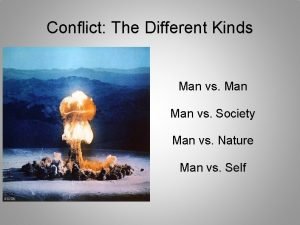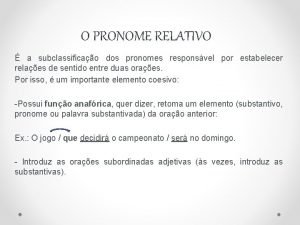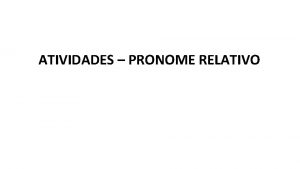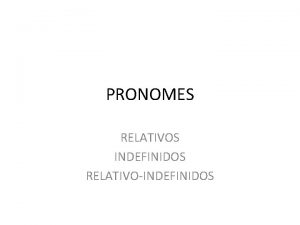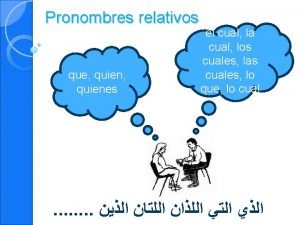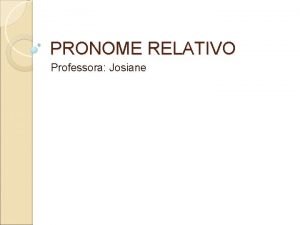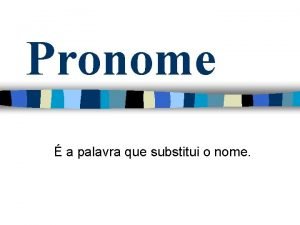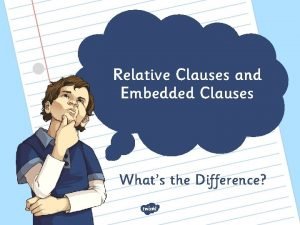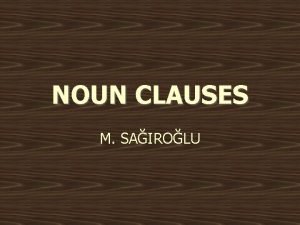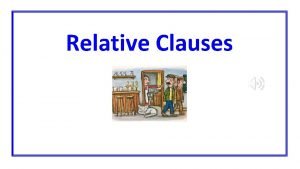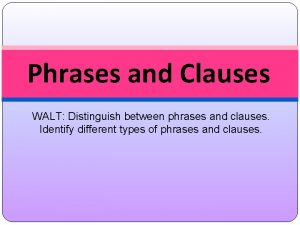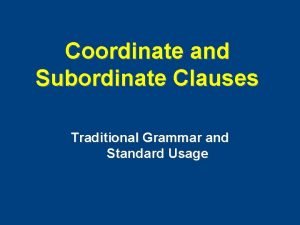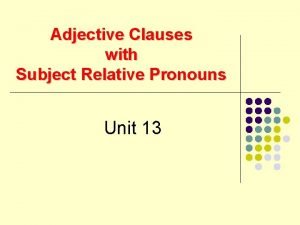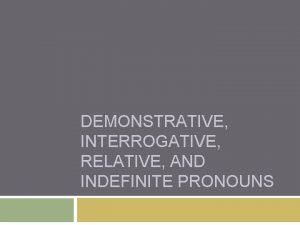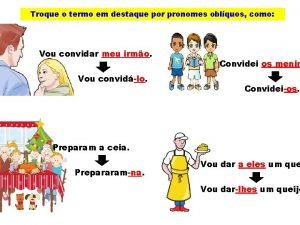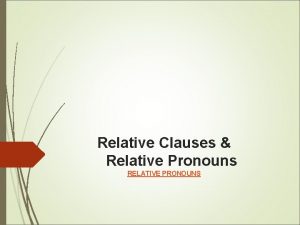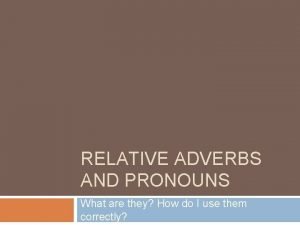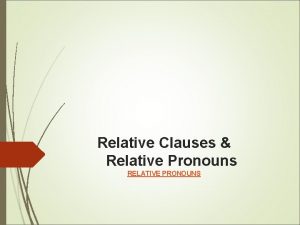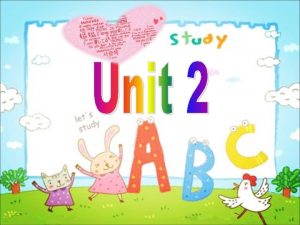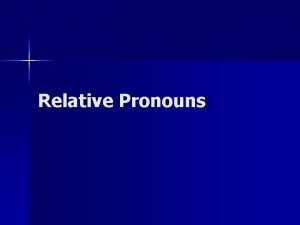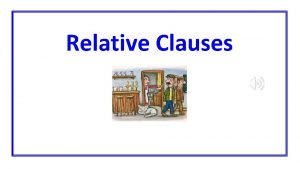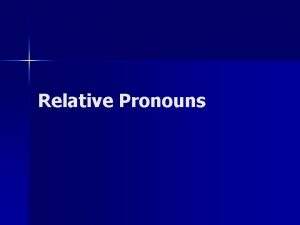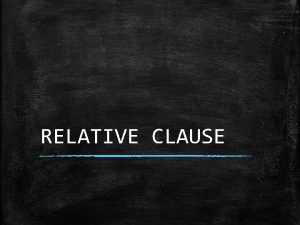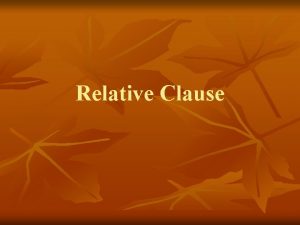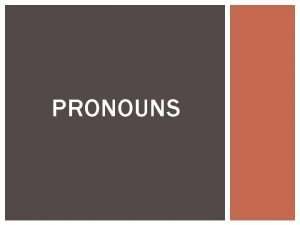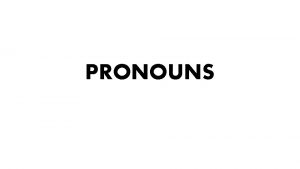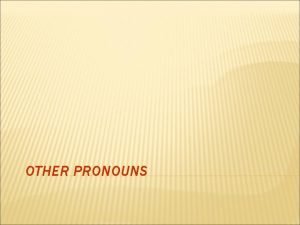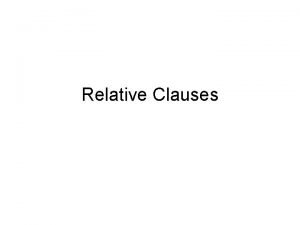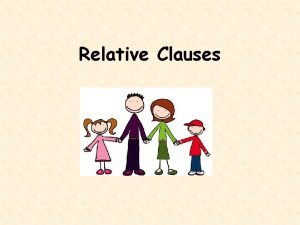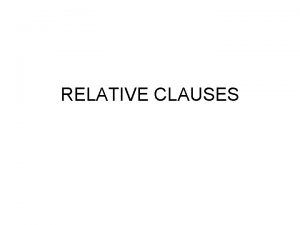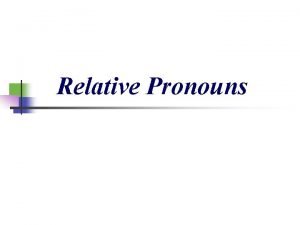Relative Pronouns Pronomes Relativos Relative Clause The man




















- Slides: 20

Relative Pronouns Pronomes Relativos


Relative Clause The man who lives next door is very friendly. Where is the milk that was in the fridge?

Defining Clause • Quando a Relative Clause não pode ser omitida, é essencial para o significado da frase People who don’t eat meat are called vegetarians.

Non-Defining Clause • Quando a Relative Clause pode ser omitida, apenas traz informação extra, sempre vem entre vírgulas My boss, who is 45, walks to work every morning.

Pronomes Relativos • Who / that = quem – usado quando o antecedente for pessoa The lady who left the room is my cousin. (sujeito) The lady who I talked to is my cousin. (objeto)

Pronomes Relativos • Whom / that = quem – usado quando o antecedente for pessoa The lady whom I talked to is my cousin. (objeto)

Pronomes Relativos • Which / that = que, o (a) qual – usado quando o antecedente for coisa The bakery which is on the corner is very cheap. (sujeito) The bakery which I like is closed. (objeto)

Pronomes Relativos • That = que – usado quando o antecedente for pessoa ou coisa, nunca entre vírgulas, único após superlativos e pronomes indefinidos Jean is the most beautiful person that I have ever met. Everybody that came to the party had lots of fun.

Pronomes Relativos • Where = onde – indica lugar The factory where I work is far from here. • When = quando - indica tempo Is there a time when we can meet?

Pronomes Relativos • Whose = cujo (a) – usado quando o antecedente for pessoa ou coisa, indicando posse Jane is the woman whose car he crashed into. That is the dog whose owner is blind.

Reflexive Pronouns Pronomes Reflexivos

Pronomes Reflexivos

Pronomes Reflexivos • Reflexivo • Enfático • Idiomático • Recíproco

Pronome Reflexivo • Após o verbo da oração, concordando com o sujeito She combs herself before leaving. I cut myself last night.

Pronome Enfático • Após o sujeito ou objeto da oração, dependendo do que se pretenda enfatizar I myself saw the actress. (enfatizando o sujeito) I saw the actress herself. (enfatizando o objeto)

Pronome Idiomático • By + self / selves (= sozinho, sem ajuda), concordando com o sujeito She decided to live by herself. We usually study by ourselves.

Pronome Recíproco • each other / one another John and Mary love each other. John and Mary love one another.

who which whose who

himself herself ourselves yourself myself himself
 Man vs man examples
Man vs man examples O que é pronome
O que é pronome Atividades com pronomes relativos
Atividades com pronomes relativos Pronome de relativo
Pronome de relativo Pronombres de relativo ingles
Pronombres de relativo ingles Que es pronombre
Que es pronombre O'que é pronome relativo
O'que é pronome relativo Pronome a
Pronome a Pronome relative
Pronome relative Relative embedded clause
Relative embedded clause Relative clause noun clause farkı
Relative clause noun clause farkı Embedded clause examples
Embedded clause examples Phrase and sentence
Phrase and sentence Types of clauses
Types of clauses Adjective clauses with object pronouns
Adjective clauses with object pronouns Possessive relative pronoun
Possessive relative pronoun Demonstrative and relative adjectives
Demonstrative and relative adjectives Frases com pronomes pessoais
Frases com pronomes pessoais Stage 15 relative clauses and relative pronouns
Stage 15 relative clauses and relative pronouns Relative clauses jeopardy
Relative clauses jeopardy Relative pronouns examples
Relative pronouns examples
